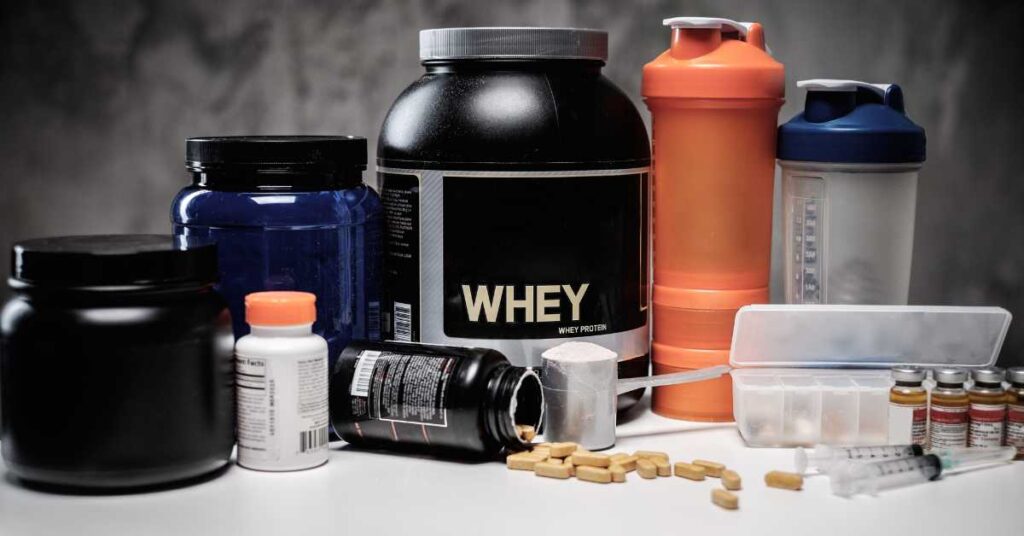Introduction
Supplements have become a common tool in the arsenal of athletes looking to unlock their full potential. From enhancing performance and recovery to supporting overall well-being, the right supplements can make a noticeable difference in athletic pursuits. In this comprehensive guide, we’ll explore the top supplements every athlete should consider incorporating into their regimen.
By understanding their benefits and how they work, you can make informed decisions to optimize your athletic performance and take your achievements to new heights.
The Foundation: Nutrition and Training
Before diving into supplements, it’s essential to establish a strong foundation of proper nutrition and training. Supplements should never be a substitute for a balanced diet and a well-designed training program. They are intended to complement your efforts and provide targeted support where needed.
Understanding the Role of Supplements
Supplements can play various roles in athletic performance, recovery, and overall well-being. They can provide essential nutrients, boost energy levels, support muscle repair, reduce inflammation, enhance focus, and much more. It’s crucial to have a clear understanding of how supplements work and what they can offer to make informed choices.
Pre-Workout Supplements: Energize and Optimize
Caffeine: Boost Energy and Focus
Caffeine is a popular pre-workout supplement known for its stimulating effects. It can enhance alertness, improve focus, and increase endurance. We’ll explore how caffeine works, its potential benefits and drawbacks, and the optimal ways to incorporate it into your routine.
Beta-Alanine: Delay Fatigue and Enhance Endurance
Beta-alanine is an amino acid that helps reduce fatigue and improve endurance by buffering lactic acid accumulation in the muscles. We’ll delve into the science behind beta-alanine, its effects on athletic performance, and the recommended dosage and timing.
Creatine: Increase Strength and Power
Creatine is one of the most researched and effective supplements for increasing strength and power. It helps regenerate ATP, the body’s primary energy source for high-intensity activities. We’ll discuss the benefits of creatine supplementation, loading and maintenance phases, and potential side effects.
Intra-Workout Supplements: Sustain and Hydrate
BCAAs: Preserve Muscle Mass and Reduce Fatigue
Branched-chain amino acids (BCAAs) are crucial for muscle protein synthesis and energy production. They can help preserve muscle mass and reduce fatigue during intense workouts. We’ll explore the role of BCAAs, their potential benefits, and the best ways to incorporate them into your intra-workout routine.
Electrolyte Blends: Maintain Hydration and Performance
During prolonged exercise, maintaining proper hydration and electrolyte balance is crucial. Electrolyte blends containing minerals like sodium, potassium, and magnesium can help prevent dehydration and support optimal performance. We’ll discuss the importance of electrolytes, the best sources, and how to choose the right electrolyte blend for your needs.
Post-Workout Supplements: Recover and Rebuild
Whey Protein: Support Muscle Repair and Growth
Whey protein is a staple post-workout supplement that provides essential amino acids for muscle repair and growth. We’ll explore its benefits, the importance of timing and dosage, and different types of whey protein available.
L-Glutamine: Aid in Recovery and Immune Function
L-Glutamine is an amino acid that plays a vital role in muscle recovery, immune function, and gut health. We’ll delve into its benefits for athletes, the potential effects on muscle soreness and immune support, and the recommended dosage.
Tart Cherry Extract: Reduce Inflammation and Muscle Soreness
Tart cherry extract has gained attention for its anti-inflammatory properties and potential benefits in reducing muscle soreness. We’ll uncover the science behind tart cherry extract, its impact on recovery, and the best ways to incorporate it into your post-workout routine.
Joint Health Supplements: Protect and Support
Glucosamine and Chondroitin: Maintain Joint Integrity
Glucosamine and chondroitin are popular supplements known for their potential to support joint health and reduce joint pain. We’ll discuss how these compounds work, their potential benefits, and the best practices for supplementation.
Omega-3 Fatty Acids: Reduce Inflammation and Enhance Mobility
Omega-3 fatty acids have anti-inflammatory properties and can contribute to joint health. We’ll explore the benefits of omega-3s for athletes, the different sources available, and how to ensure sufficient intake for optimal joint support.
Antioxidant Supplements: Combat Oxidative Stress
Vitamin C: Boost Immune Function and Aid Recovery
Vitamin C is an essential antioxidant that supports immune function and aids in recovery. We’ll discuss the benefits of vitamin C for athletes, the recommended daily intake, and natural food sources rich in this vital nutrient.
Coenzyme Q10: Enhance Energy Production and Recovery
Coenzyme Q10 is a naturally occurring antioxidant that plays a crucial role in energy production and cellular health. We’ll explore its potential benefits for athletes, its impact on recovery, and the appropriate dosage.
Green Tea Extract: Provide Antioxidant Protection
Green tea extract is rich in antioxidants, including catechins and polyphenols, which have been studied for their potential health benefits. We’ll delve into how green tea extract may support athletic performance, its antioxidant properties, and the best ways to incorporate it into your regimen.
Mental Focus Supplements: Sharpen Your Mind
Omega-3 Fatty Acids: Support Brain Health and Cognitive Function
Omega-3 fatty acids not only benefit physical performance but also support brain health and cognitive function. We’ll explore their impact on mental focus, memory, and overall brain health. Discover the best sources and supplementation options for omega-3s.
Rhodiola Rosea: Improve Mental Performance and Reduce Fatigue
Rhodiola Rosea is an adaptogenic herb known for its potential to improve mental performance and reduce fatigue. We’ll uncover the science behind Rhodiola Rosea, its effects on stress reduction, and its potential benefits for athletes. Learn how to incorporate Rhodiola Rosea effectively into your routine.
Lion’s Mane Mushroom: Enhance Focus and Memory
Lion’s Mane mushroom has been used in traditional medicine for centuries and is now gaining attention for its potential cognitive-enhancing effects. We’ll explore the research behind Lion’s Mane, its impact on focus, memory, and overall cognitive function. Discover the best ways to incorporate Lion’s Mane into your routine.
Sleep and Recovery Supplements: Rest and Recharge
Magnesium: Promote Relaxation and Restful Sleep
Magnesium is a mineral that plays a vital role in relaxation, sleep quality, and recovery. We’ll discuss how magnesium can support athletic performance, the best forms of magnesium for supplementation, and the appropriate dosage.
Melatonin: Regulate Sleep-Wake Cycles and Enhance Recovery
Melatonin is a hormone that regulates sleep-wake cycles and can help improve sleep quality and recovery. We’ll explore its benefits for athletes, the optimal dosage, and considerations for safe and effective use.
5-HTP: Improve Sleep Quality and Mood
5-HTP is a compound that plays a role in serotonin production, which can promote sleep quality and improve mood. We’ll uncover the potential benefits of 5-HTP for athletes, its impact on recovery and mood, and the appropriate dosage.
Choosing the Right Supplements
Consulting with a Qualified Professional
When considering supplements, it’s crucial to consult with a qualified professional, such as a sports nutritionist or registered dietitian. They can assess your specific needs, goals, and potential interactions with medications or pre-existing conditions to provide personalized guidance.
Considering Individual Needs and Goals
Every athlete is unique, and individual needs and goals should be taken into account when selecting supplements. Factors such as sport type, training intensity, dietary preferences, and health considerations play a role. We’ll provide tips on how to evaluate your needs and choose supplements that align with your aspirations.
Conclusion
Supplements can be valuable tools in optimizing athletic performance, supporting recovery, and enhancing overall well-being. However, it’s important to approach supplementation with knowledge, caution, and individualization. By understanding the benefits of various supplements, consulting with professionals, and considering your specific needs and goals, you can make informed choices to unlock your full potential as an athlete.
Frequently Asked Questions (FAQs)
Q1: Are supplements safe for athletes?
A1: Many supplements are generally safe when used as directed, but it’s important to choose reputable brands, follow recommended dosages, and consider individual factors such as existing health conditions and medications. Consulting with a healthcare professional or registered dietitian can help ensure safety.
Q2: Can supplements replace a balanced diet?
A2: Supplements should never replace a balanced diet, as whole foods provide a wide array of essential nutrients. They should be used to complement a healthy eating plan and address specific needs that may be challenging to meet through diet alone.
Q3: Can I take multiple supplements together?
A3: While many supplements can be taken together safely, it’s important to consider potential interactions and overlapping ingredients. Consulting with a healthcare professional or registered dietitian can help determine safe and effective supplement combinations based on your individual needs and goals.
Q4: How long should I take a specific supplement before assessing its effectiveness?
A4: The time it takes to experience the effects of a supplement can vary, and individual responses may differ. It’s recommended to give a supplement sufficient time (e.g., several weeks) while closely monitoring your progress and considering other lifestyle factors that may impact results.
Q5: Are natural or organic supplements better than synthetic ones?
A5: Both natural and synthetic supplements can have their benefits and drawbacks. The key is to choose high-quality products from reputable brands that undergo rigorous testing for safety and efficacy. The decision between natural and synthetic supplements may depend on individual preferences and specific health considerations.
Disclaimer: When it comes to sport nutrition, always seek professional guidance and advice from medical professionals, nutritionists and other relevant professionals who will be in a position to better address specific concerns or issues related to your individual situation. In no event shall we be liable for any direct, indirect, incidental, special, or consequential damages arising out of or in connection with your use of this website or the content provided herein.







